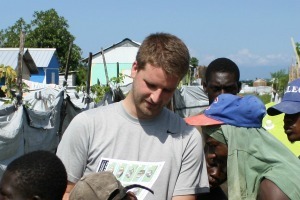Engineering2Empower (E2E) is a start-up that is the direct result of an ESTEEM Capstone Thesis Project and the research of Professors Tracy Kijewski-Correa and Alexandros Taflanidis. Its mission is to deliver safe, affordable housing for the world’s urban poor through sustainable, community driven-development. Starting in Haiti, where 300,000+ Haitians are still without permanent shelter after the 2010 earthquake, E2E utilizes a concrete frame and panel structural system, vastly improving performance over the traditional unreinforced masonry.
With a target customer that makes just $600 per year, a viable business called for progressive construction and financing. Utilizing rotating savings credit associations, E2E is able to help customers finance homes progressively through the power of group savings, while also creating a constant income stream for the business. This model decreases the cost of safety, while also building in a manner that provides temporary shelter as E2E’s customers take the long journey toward home ownership.

Dustin Mix is a 2010 graduate of the University of Notre Dame, with a B.S. in Civil Engineering. He has spent the last three years working on a M.S. in Civil Engineering, also at Notre Dame, while helping found E2E. He recently graduated from the ESTEEM Program and moved to Léogâne, Haiti in October in order to start a pilot of the E2E model.
Says Professor Kijewsi-Correa about ESTEEM: "ESTEEM is nothing short of a program that brings your ideas to life. As faculty, we rarely have the time, space and mentoring to envision how we can translate our research into something that can tangibly affect others through entrepreneurship. The ESTEEM experience demonstrated to us how, with very little additional effort on our part, what started as an idea – what engineers excel at -- could actually mature into a sustainable business – something that engineers historically do not excel at.
Not only did our initial idea mature into a prototype couched within a viable business plan, but we also experienced a maturation in our own thinking of how to frame solutions to problems in a way that maximizes their potential for impact in the future. In that regard, faculty who truly buy in to the ESTEEM paradigm, see not only their ideas but their own personal innovation process in an entirely new light."